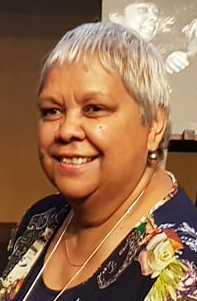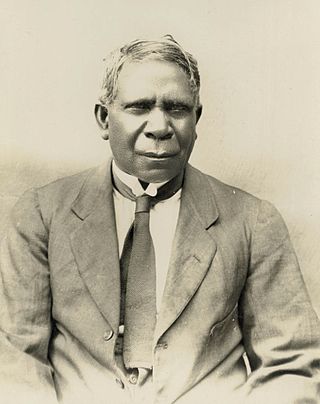Related Research Articles
Helen Dale is an Australian writer and lawyer. She is best known for writing The Hand that Signed the Paper, a novel about a Ukrainian family who collaborated with the Nazis in The Holocaust, under the pseudonym Helen Demidenko.

Australian literature is the written or literary work produced in the area or by the people of the Commonwealth of Australia and its preceding colonies. During its early Western history, Australia was a collection of British colonies; as such, its recognised literary tradition begins with and is linked to the broader tradition of English literature. However, the narrative art of Australian writers has, since 1788, introduced the character of a new continent into literature—exploring such themes as Aboriginality, mateship, egalitarianism, democracy, national identity, migration, Australia's unique location and geography, the complexities of urban living, and "the beauty and the terror" of life in the Australian bush.
Sally Jane Morgan is an Australian Aboriginal author, dramatist, and artist. Her works are on display in numerous private and public collections in Australia and around the world.

Wiradjuri is a Pama–Nyungan language of the Wiradhuric subgroup. It is the traditional language of the Wiradjuri people of Australia. A revival is underway, with the language being taught in schools. Wiraiari and Jeithi may have been dialects.
Australian Aboriginal culture includes a number of practices and ceremonies centered on a belief in the Dreamtime and other mythology. Reverence and respect for the land and oral traditions are emphasised. Over 300 languages and other groupings have developed a wide range of individual cultures. Due the colonization of Australia under terra nullius concept these cultures were treated as one monoculture. Australian Aboriginal art has existed for thousands of years and ranges from ancient rock art to modern watercolour landscapes. Aboriginal music has developed a number of unique instruments. Contemporary Australian Aboriginal music spans many genres. Aboriginal peoples did not develop a system of writing before colonisation, but there was a huge variety of languages, including sign languages.

Ian Mayelston Mudie was an Australian poet and author.

Anita Marianne Heiss is an Aboriginal Australian author, poet, cultural activist and social commentator. She is an advocate for Indigenous Australian literature and literacy, through her writing for adults and children and her membership of boards and committees.
Colin Thomas Johnson, better known by his nom de plume Mudrooroo, was an Australian novelist, poet, essayist and playwright. His many works are centred on Aboriginal Australian characters and topics; however, there was some doubt cast upon his claims to have Aboriginal ancestry.

Jacqueline Gail "Jackie" Huggins is an Aboriginal Australian author, historian, academic and advocate for the rights of Indigenous Australians. She is a Bidjara/Pitjara, Birri Gubba and Juru woman from Queensland.

Bronwyn Bancroft is an Aboriginal Australian artist, administrator, book illustrator, and among the first three Australian fashion designers to show their work in Paris. She was born in Tenterfield, New South Wales, and trained in Canberra and Sydney.
Philip McLaren is an Aboriginal Australian author and academic known for literary fiction, detective stories and thrillers.
Magabala Books is an Indigenous publishing house based in Broome, Western Australia.

Bruce Pascoe is an Australian writer of literary fiction, non-fiction, poetry, essays and children's literature. As well as his own name, Pascoe has written under the pen names Murray Gray and Leopold Glass. Pascoe identifies as Aboriginal. Since August 2020, he has been Enterprise Professor in Indigenous Agriculture at the University of Melbourne.

Judy Watson is an Australian Waanyi multi-media artist who works in print-making, painting, video and installation. Her work often examines Indigenous Australian histories, and she has received a number of high profile commissions for public spaces.

Indigenous Australian literature is the fiction, plays, poems, essays and other works authored by Aboriginal and Torres Strait Islander people of Australia.

The grievance studies affair was the project of a team of three authors—Peter Boghossian, James A. Lindsay, and Helen Pluckrose—to highlight what they saw as poor scholarship and erosion of standards in several academic fields. Taking place over 2017 and 2018, their project entailed submitting bogus papers to academic journals on topics from the field of critical social theory, in cultural, queer, race, gender, fat, and sexuality studies to determine whether they would pass through peer review and be accepted for publication. Several of these papers were subsequently published, which the authors cited in support of their contention.
Jared Thomas is an Australian author of children's fiction, playwright and museum curator. Several of his books have been shortlisted for awards, and he has been awarded three writing fellowships.

Dark Emu: Black Seeds: Agriculture or Accident? is a 2014 non-fiction book by Bruce Pascoe. It reexamines colonial accounts of Aboriginal people in Australia, and cites evidence of pre-colonial agriculture, engineering and building construction by Aboriginal and Torres Strait Islander peoples. A second edition, published under the title Dark Emu: Aboriginal Australia and the Birth of Agriculture was published in mid-2018, and a version of the book for younger readers, entitled Young Dark Emu: A Truer History, was published in 2019.
References
Citations
- 1 2 3 "Carmen, Leon". The Australian Literature Resource. 1 September 2010. Retrieved 28 August 2012.
- 1 2 3 4 5 6 Carmen, Leon (15 March 1997). "Leon and a ruse called Wanda". The Daily Telegraph . News Corporation. pp. 30–31.
- ↑ Koolmatrie 1994, publishing notes.
- 1 2 Koolmatrie 1994, p. 216.
- 1 2 3 "John Vincent Bayley - papers, 1994?-1998". Manuscripts, oral history & pictures. State Library of New South Wales . Retrieved 28 August 2012.
- 1 2 Raymond, Adam K. (1 April 2011). "Successful people who never existed". CNN.com . Turner Broadcasting System . Retrieved 28 August 2012.
- ↑ Cooper, Nathanael (5 May 2012). "One Hoax that's the genuine article". The Courier-Mail . News Limited . Retrieved 28 August 2012.
- ↑ Bayley 2004.
- ↑ Koolmatrie 1994, rear cover.
- ↑ Morrissey, Philip (2003). "Stalking Aboriginal culture: the Wanda Koolmatrie affair". Australian Feminist Studies. 18 (42): 299–307. doi:10.1080/0816464032000151775. S2CID 143736112.
Sources
- Koolmatrie, Wanda (1994). My Own Sweet Time (1st ed.). Broome, Western Australia: Magabala Books Aboriginal Corporation. ISBN 1-875641-22-X.
- Bayley, John (2004). Daylight corroboree : a first-hand account of the "Wanda Koolmatrie" hoax. Cambelltown, South Australia: Eidolon Books. ISBN 0958546649.